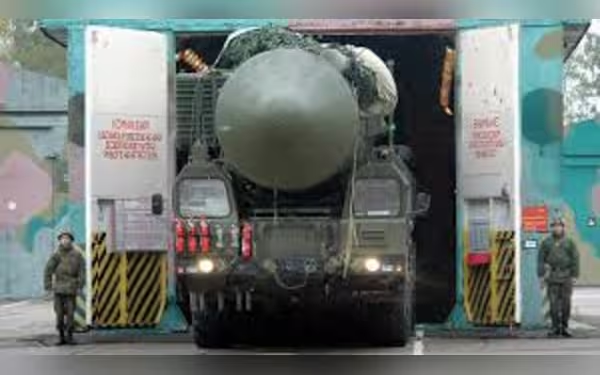Sunday, December 22, 2024 09:28 AM
West's Strategic Response to Russia's Nuclear Threats
- Biden administration's missile support escalates tensions.
- Russia's nuclear threats may signal anger, not intent.
- China's influence moderates Russia's aggressive posturing.
 Image Credits: thefrontierpost
Image Credits: thefrontierpostThe West must respond strategically to Russia's nuclear threats while ensuring global security and stability.
In recent weeks, the world has been gripped by rising fears of nuclear conflict, reminiscent of the Cold War era. The situation escalated when the Biden administration approved Ukraine's use of advanced missile systems against targets in Russia. This decision was met with a swift and dramatic response from Russian President Vladimir Putin, who revised Russia's nuclear doctrine and showcased a new hypersonic missile. Such developments have sparked alarm across the globe, with headlines warning of potential nuclear strikes.
Despite the intense media coverage and public anxiety, experts suggest that the actual risk of nuclear war remains low. The Kremlin's aggressive posturing, including threats and missile launches, may be more about signaling anger than a genuine intent to escalate to nuclear warfare. In fact, many analysts believe that these actions indicate a lack of willingness from Russia to engage in nuclear conflict, especially given the strong deterrent measures in place.
Historically, the fear of nuclear war has often served as a deterrent, compelling nations to communicate clearly and avoid misunderstandings. The Biden administration has made it clear to Russia that any use of nuclear weapons would lead to severe consequences. This transparency is crucial, as it helps prevent miscalculations that could spiral into catastrophic outcomes.
Moreover, the influence of China on Russia cannot be overlooked. As Russia finds itself increasingly dependent on China for economic and political support, it is likely that Beijing's disapproval of nuclear threats plays a role in moderating Moscow's behavior. This dynamic adds another layer of complexity to the situation, suggesting that the West's response to Russia's actions must be measured and strategic.
It is essential for Western nations to recognize that Russia's hostility is not solely a reaction to military support for Ukraine. The narrative that the West, particularly the "Anglo-Saxons," is an existential threat to Russia is deeply ingrained in Putin's ideology. This perception will not change simply because the West adjusts its military assistance. Therefore, it is crucial for Western policymakers to prepare for a long-term strategy that addresses this ongoing hostility.
While the current climate may be fraught with tension and fear, it is vital for the West to remain resolute in the face of nuclear threats. Refusing to yield to nuclear blackmail is a necessary stance to ensure global security. As we navigate this complex geopolitical landscape, it is clear that the principles of deterrence, clear communication, and strategic planning will be essential in maintaining peace and stability in the region.













